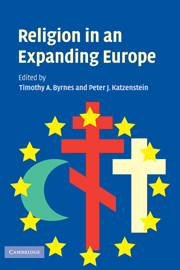Book contents
- Frontmatter
- Contents
- List of contributors
- Preface
- 1 Multiple modernities as limits to secular Europeanization?
- Part I European settings
- Part II Catholicism
- Part III Orthodoxy
- Part IV Islam
- 8 Europeanizing Islam or the Islamization of Europe: political democracy vs. cultural difference
- 9 Islam and Europeanization in Turkish-Muslim socio-political movements
- Part V Conclusion
- References
- Index
9 - Islam and Europeanization in Turkish-Muslim socio-political movements
Published online by Cambridge University Press: 22 September 2009
- Frontmatter
- Contents
- List of contributors
- Preface
- 1 Multiple modernities as limits to secular Europeanization?
- Part I European settings
- Part II Catholicism
- Part III Orthodoxy
- Part IV Islam
- 8 Europeanizing Islam or the Islamization of Europe: political democracy vs. cultural difference
- 9 Islam and Europeanization in Turkish-Muslim socio-political movements
- Part V Conclusion
- References
- Index
Summary
My essay examines how Turkey's diverse Islamic groups' attitudes toward Europe have changed from rejectionism to accommodation and embrace as a result of interactions with European institutions and changing conditions inside Turkey. In the process of interacting with Europe, a new accommodative cognitive map of Islamic identity has emerged. This new understanding treats Europe and Islam as potentially mutually reconcilable and not oppositional identities locked in constant struggle. Thus, not Islam or a sui generis Islamic civilization, but dialectical engagement shapes one's perception of the “other.”
This essay differs from Bassam Tibi's essentialist image of a rigid and uniform manifestation(s) of socio-political Islam(s) and a frozen broader Islamic civilization. Tibi's analysis of Euro-Islam is marked by a triangular relationship between essentialism, chauvinism, and fear. He draws the boundaries of Islamic identity around the reified historical notions of jihad, hijra, and daʾwa, and he does not want to entertain the possibility of symbolic meanings and multiple understandings of a text or tradition conditioned by and evolving due to internal and external factors in the manifestation of a given Muslim collective self. This essentialist and reductionist outlook amplifies the paradox identified by Edmund Burke for many secular nationalists in the Middle East, who have become inside-out orientalists in their quest for modernity. This is probably why Tibi opts for a “reformed” Islam, informed by and disciplined via the historically particular case of the Christian Reformation and European Enlightenment.
- Type
- Chapter
- Information
- Religion in an Expanding Europe , pp. 225 - 255Publisher: Cambridge University PressPrint publication year: 2006
- 7
- Cited by

